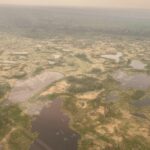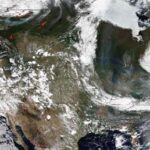Of all the words used to describe Californian Russ George over the past decade, most scientists would probably agree on one in job description in particular: “rogue geoengineer.”
Bashed worldwide as a “climate hacker,” self-proclaimed entrepreneur and businessman Russ George is a man with a vision.
It all started in 2007 when George founded Planktos, a company aimed to “restore damaged habitats” through altering plankton ecosystems and reforestation.
One of the company’s first projects included growing a forest in Hungary to offset the Vatican’s entire carbon footprint – an act that led critics to complain that George’s efforts were a business scam, with little regard for the environment.
Another geoengineering project of headed by George, which created much controversy, was his plan to dump iron sulphate off the coast of the Galapagos and Canary Islands.
George planned to dump the iron to create a massive outbreak of phytoplankton, which would in turn collect carbon from the atmosphere and sink to the oceans floor. Once completed, George, and his company Planktos, could then sell the so-called “carbon credits” for profit.
A plan which, according to the Guardian, has left George blacklisted at various international ports after a worldwide outcry stopped George’s plans.
But only a few years later, George is making headlines again.
In October, George went through with his plans and dumped around 100 tons of iron sulphate into the ocean; this time into the Pacific Ocean off the coast of British Columbia. And once again, the reaction has been far from positive.
George convinced local fishing villages along the Canadian coast to invest in his project under the falsity that his goal was to benefit the salmon fishing industry, despite his history with Planktos in the field of geoengineering.
Scientists everywhere warn that because the concept of geoengineering is still relatively new, it is simply impossible to understand the future implications of any experiment along these lines.
Altering the ecology of the ocean, no matter how small or large of an area, could create entirely unforeseen problems in the future.
But the question remains, is it truly possible for one single “rogue geoengineer” to alter Earth’s environmental discourse?
As defined by the Royal Society, geoengineering is the deliberate large-scale manipulation of the planetary environment to counteract anthropogenic climate change.
In the wake of Hurricane Sandy, climate change has been on the minds of both politicians and the general public alike.
As of now, resorting to extreme methods of climate control, like those of George, have generally been condemned.
Despite this, research in the field of geoengineering – such as the findings of Harvard’s David Keith –suggests great possibilities when looking to the future.






